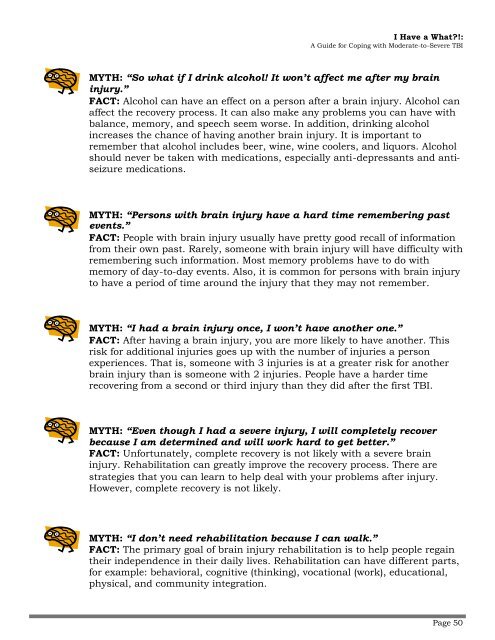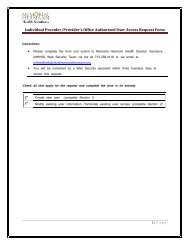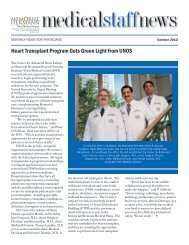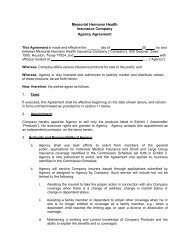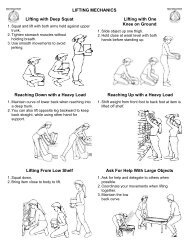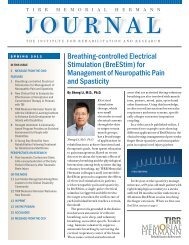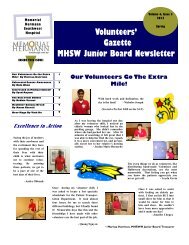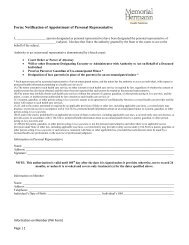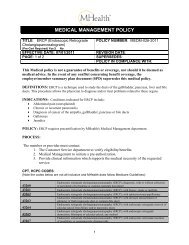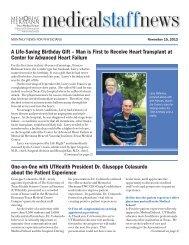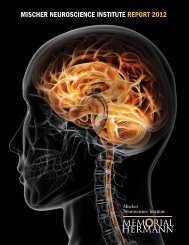I Have a What? A Guide for Coping with Moderate-to-Severe TBI
I Have a What? A Guide for Coping with Moderate-to-Severe TBI
I Have a What? A Guide for Coping with Moderate-to-Severe TBI
- No tags were found...
Create successful ePaper yourself
Turn your PDF publications into a flip-book with our unique Google optimized e-Paper software.
I <strong>Have</strong> a <strong>What</strong>?!:A <strong>Guide</strong> <strong>for</strong> <strong>Coping</strong> <strong>with</strong> <strong>Moderate</strong>-<strong>to</strong>-<strong>Severe</strong> <strong>TBI</strong>MYTH: “So what if I drink alcohol! It won’t affect me after my braininjury.”FACT: Alcohol can have an effect on a person after a brain injury. Alcohol canaffect the recovery process. It can also make any problems you can have <strong>with</strong>balance, memory, and speech seem worse. In addition, drinking alcoholincreases the chance of having another brain injury. It is important <strong>to</strong>remember that alcohol includes beer, wine, wine coolers, and liquors. Alcoholshould never be taken <strong>with</strong> medications, especially anti-depressants and antiseizuremedications.MYTH: “Persons <strong>with</strong> brain injury have a hard time remembering pastevents.”FACT: People <strong>with</strong> brain injury usually have pretty good recall of in<strong>for</strong>mationfrom their own past. Rarely, someone <strong>with</strong> brain injury will have difficulty <strong>with</strong>remembering such in<strong>for</strong>mation. Most memory problems have <strong>to</strong> do <strong>with</strong>memory of day-<strong>to</strong>-day events. Also, it is common <strong>for</strong> persons <strong>with</strong> brain injury<strong>to</strong> have a period of time around the injury that they may not remember.MYTH: “I had a brain injury once, I won’t have another one.”FACT: After having a brain injury, you are more likely <strong>to</strong> have another. Thisrisk <strong>for</strong> additional injuries goes up <strong>with</strong> the number of injuries a personexperiences. That is, someone <strong>with</strong> 3 injuries is at a greater risk <strong>for</strong> anotherbrain injury than is someone <strong>with</strong> 2 injuries. People have a harder timerecovering from a second or third injury than they did after the first <strong>TBI</strong>.MYTH: “Even though I had a severe injury, I will completely recoverbecause I am determined and will work hard <strong>to</strong> get better.”FACT: Un<strong>for</strong>tunately, complete recovery is not likely <strong>with</strong> a severe braininjury. Rehabilitation can greatly improve the recovery process. There arestrategies that you can learn <strong>to</strong> help deal <strong>with</strong> your problems after injury.However, complete recovery is not likely.MYTH: “I don’t need rehabilitation because I can walk.”FACT: The primary goal of brain injury rehabilitation is <strong>to</strong> help people regaintheir independence in their daily lives. Rehabilitation can have different parts,<strong>for</strong> example: behavioral, cognitive (thinking), vocational (work), educational,physical, and community integration.Page 50


